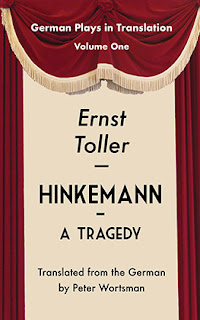Kurt Tucholsky's first novel Rheinsberg takes place in a small town of the same name north of Berlin with tinder houses, cobblestone streets, and an old castle. The author, who calls himself Wolfgang, spends a weekend in August 1911 at a lakeside hotel with his girlfriend Claire. Not much is happening in this lighthearted story, but the two young lovers, strolling the town, have a lot of fun.
Claire's real name was Else Weil. She was a medical student from Berlin who would soon become one of Germany's first female doctors. She would also marry Tucholsky but keep working, very unusual at this time. But the marriage with Tucholsky, the unruly spirit and literary genius who had his eyes already set on this second wife Mary Gerold would not last.
In 1933, when the Nazis came to power, Tucholsky, who was Jewish, fled to Sweden. Two years later, stranded without money and without a long-term residency permit and guilt-ridded about his bad choices about the women in his life, he killed himself.
The same year, Else Weil lost permission to practice medicine. She worked as a nanny for her cousin, who took her in. In 1938, after Kristallnacht, she fled to the Netherlands and then to Paris. Here, she met Friedrich Epstein, also a refugee from Nazi Germany. After the Wehrmacht conquered Paris, they escaped to the — yet unoccupied — south of France. They were rounded up by Vichy authorities, locked up in the concentration camps of Gurs and Les Milles.
In 1942, Else was brought to Drancy, on the outskirts of Paris. She was deported to Auschwitz in September of the same year. Her recorded date of death is December 31, 1942. She was fifty-three years old. Epstein died in Auschwitz one year later.
This is the day we remember the liberation of Auschwitz. But let's also remember a young woman, full of life and compassion, who was made immortal by a weekend-long summer vacation in a small town, with a castle, and a lake, and a lover long gone.
Claire's real name was Else Weil. She was a medical student from Berlin who would soon become one of Germany's first female doctors. She would also marry Tucholsky but keep working, very unusual at this time. But the marriage with Tucholsky, the unruly spirit and literary genius who had his eyes already set on this second wife Mary Gerold would not last.
In 1933, when the Nazis came to power, Tucholsky, who was Jewish, fled to Sweden. Two years later, stranded without money and without a long-term residency permit and guilt-ridded about his bad choices about the women in his life, he killed himself.
The same year, Else Weil lost permission to practice medicine. She worked as a nanny for her cousin, who took her in. In 1938, after Kristallnacht, she fled to the Netherlands and then to Paris. Here, she met Friedrich Epstein, also a refugee from Nazi Germany. After the Wehrmacht conquered Paris, they escaped to the — yet unoccupied — south of France. They were rounded up by Vichy authorities, locked up in the concentration camps of Gurs and Les Milles.
In 1942, Else was brought to Drancy, on the outskirts of Paris. She was deported to Auschwitz in September of the same year. Her recorded date of death is December 31, 1942. She was fifty-three years old. Epstein died in Auschwitz one year later.
This is the day we remember the liberation of Auschwitz. But let's also remember a young woman, full of life and compassion, who was made immortal by a weekend-long summer vacation in a small town, with a castle, and a lake, and a lover long gone.






